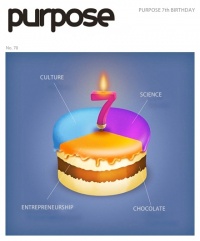
On the Margin
The only right way

Maciej Mazerant, Purpose publisher
For seven years “Purpose” magazine has been promoting ideas of entrepreneurship in culture. The outcomes of this entrepreneurship might include high quality cultural products and services, which are also the foundation of the development of creative industry. In my view, the current great interest in the field in Poland is a positive change. It is also a form of recognition of our hard grassroots work, which we have been doing for the last seven years. I am glad that “Purpose” is perceived as opinion-forming and content-focused tool of predicting new tendencies. I am also glad that we could share our experience during so many ventures organized in Poland in 2011. However, I am slightly worried that they result only in publications, web sites and annual reports. If there are any other outcomes, it is difficult to find out about them and notice them.
Last year the most important event to which I was invited as the publisher of “Purpose” magazine, was undoubtedly the international conference "Competences in Culture" organized as a part of Polish Presidency of the European Union. At the conference I presented the results of the project "Creative Self-Employed" (“Kreatywni samozatrudnieni”) and its second edition prepared for the city of Łodź . There were many different reactions to my speech. On the one hand, the conclusions concerning entrepreneurship as essential part of achieving success in culture were well received. On the other hand, the conclusions about EU funds got cold reception, in particular by the representative of European Commission. For, to my mind, the EU funds caused laziness both among European project organizers and beneficiaries and they also spoiled the cultural market and creative industry by introducing services and products available "for free".
In 2011 I had the pleasure of teaching students at the Academy of Fine Arts in Wrocław. My lecture "It must be the money..." (“Jeżeli nie wiadomo, o co chodzi..., to chodzi o pieniądze”) was concerned with entrepreneurship in creative industry and I was very happy when the students, who initiated the meeting, came across as enterprising. However, I was worried, though not surprised, that the Academy itself does not organize such meetings, lectures and workshops. The Academy of Fine Arts in Cracow took a different approach. Through its thriving Careers Center, the Academy organized a series of workshops and a conference "ProArte -- Enterprising Art" (“ProArte – sztuka przedsiębiorcza”) for its students. As a part of the project, I gave a lecture "The Artist – an Incurable Optimist" (“Artysta – niepoprawny optymista “) addressing the issue of entrepreneurship and culture as an alternative for the crisis.
In Warsaw in 2011 there were many events connected with the promotion of creative industry and culture as a space of professional self-fulfillment. Kordegarda Gallery organized a series of meetings as a part of the project "Graduate" (“Absolwent”). I took part in two seminars as a speaker. The first meeting was dedicated to sole proprietorship in creative industry and the second was concerned with the EU funds and where to get money for organization of cultural initiatives. As a close-up of the year, I participated in the project "Creativity Action" (“Akcja Kreatywność “)-- a four day event organized by multimedia cultural institution Mediateka at Bielany district in Warsaw. During my presentation I showed a movie that summarized very successful second edition of the project "Creative Self-Employed" (“Kreatywni samozatrudnieni”) and I also complained about officials. In addition, I called for interdisciplinary cooperation between universities and faculties, without which a dynamic development of creative industry with many high quality innovative products and services will not be possible.
I also suggested similar solutions during the previously mentioned conference in Cracow as well as at the experts panel evaluating the implementation of infrastructural projects in Polish artistic higher education, which was organized by ASM - Market Research and Analysis Center for the Ministry of Culture and National Heritage. I have the feeling that my ideas did not appeal to the director of the Department of Art and Culture Education in the Ministry of Culture and National Heritage. He defended the current, in my opinion old-fashioned, model of cultural education, which is based on egoistic big universities driven by their particularistic interests and operating irrespectively of the market’s needs and without cross-industry cooperation. This issue is connected with another event, to which I was invited as an expert. The research "Creative Partnerships in Poland" (“Partnerstwa kreatywne w Polsce”), carried out by the Pro Culture Foundation, has proven that in our country little is known of partnerships and developing partner relations aiming at implementing creative solutions, products and services.
As I mentioned at the beginning, in recent years, last year in particular, creativity has become very popular in Poland. Having participated in the described projects, I came to the conclusion that talking about creativity will not make us succeed in this field. We need to create conditions -- legal, infrastructural and organizational -- in order to make a joint effort to catch up with the US as well as European and Asian countries which are held up for us as a model of creativity. We are in a good position because we can avoid mistakes made by others, for instance in ecology. Just like others, we need to act dynamically to call ourselves European center of creativity.
The year 2011 has turned out to be successful for “Purpose” magazine. We finished the year with much optimism due to well organized projects. Greater Poland Design Magazine "Design_pl" (Wielkopolski Magazyn Projektowy “Design_pl”) became a success. For a year we were responsible for its publication -- from graphics, through content, print, up to distribution. The second edition of "Creative Self-Employed" (“Kreatywni samozatrudnieni”) also came out very well. The project included creating 16 editions of a newsletter and the same number of promotion videos of creative industry in Łodź. We developed an investment project funded by the EU due to which we now have a mobile TV studio and we are setting up an e-shop as well. In addition to this, our flagship project – “Purpose” magazine -- has been given a new layout and new functions such as user profile and tender sections. In 2011 we provided media sponsorship for a record number of initiatives, and we also significantly increased the number of users and page views. 2012 promises to be equally interesting. I hope you will be there with us.
Maciej Mazerant
Check the archive

no 70 December 2012
theme of the issue:
PURPOSE 7th BIRTHDAY
< spis treści
Article
From editors
Analysis
Culture in Crisis - Artur Zaguła
Career in Culture
Cooperation Platform - an interview with Mateusz Halicki, Ph. D., the coordinator of the Creative Communication Cluster – by Maciej Mazerant
Culture Industries
Following its own path - an interview with Ralph Wiegmann, iF Managing Director - Maciej Mazerant
On the Margin
The only right way - Maciej Mazerant





